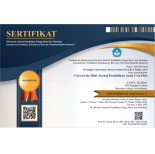Educated by Hitting: Examining Authoritarian Parenting Patterns in the Batak Toba Ethnic Community in the Samosir Area, Ambarita Village
Abstract
Keywords
Full Text:
PDFReferences
Andriani, F., and Rachmawati, Y. (2022). Etnoparenting: Pengasuhan orang tua perkawinan multi etnis. Jurnal Obsesi: Jurnal Pendidikan Anak Usia Dini, 6(5), 4669-4680.
Anwar, I. S. S. (2019). A comparison of student disruptive behavior in terms of family social support. Basic education, 8(23), 2-190.
Diananda, A. (2019). Psikologi remaja dan permasalahannya. ISTIGHNA: Jurnal Pendidikan dan Pemikiran Islam, 1(1), 116-133.
Fatmawati, E., Ismaya, EA, dan Setiawan, D. (2021). Pola asuh orang tua dalam memotivasi belajar anak pada pembelajaran berani. Jurnal Pendidikan, 7(1), 104–110.
Febiyanti, A., and Rachmawati, Y. (2021, March). Is authoritative parenting the best parenting style? In 5th International Conference on Early Childhood Education (ICECE 2020). Atlantis Press. (pp. 94-99).
Ghani, F. B. A., and bt Abd Aziz, A. (2014). The implication of parenting styles on the akhlak of muslim teenagers in the south of Malaysia. Procedia-Social and Behavioral Sciences, 114, 761-765.
Halilah, D., and Widjayatri, R. D. (2022). (StudI Kepustakaan) Implementasi ethnoparenting terhadap anak usia dini Suku Baduy. Al Ihsan: Jurnal Pendidikan Islam Anak Usia Dini, 3(2), 091-100.
Hamzah, N., and Suratman, B. (2021). Pop culture and new media impact of internet use in parenting on early childhood development. Kiddo: Jurnal Pendidikan Islam Anak Usia Dini, 4(1).
Khalmurzaeva, N. T., Omonov, Q. S., Rikhsieva, G. S., and Mirzakhmedova, K. V. (2021). Specificity of the action of silence in Japanese communication culture. Current Research Journal of Philological Sciences, 2(08), 50-55.
Mandjarreki, S., Syam, L., and Andriyani, R. (2023). The symbolic meaning of the Akkatere tradition for the indigenous people of the Kajang community. Etnosia: Jurnal Etnografi Indonesia, 8(1), 145-160.
Mason, P., Augustyn, M. M., and Seakhoa-King, A. (2021). Mixed methods research in tourism: a systematic sequential approach. Folia Turistica, 56, 1-26.
Nirwana, N., and Irmayanti, I. (2022). Etnoparenting in Bugis Tribe:(Parental practices and beliefs in the Karampung Indigenous community, Sinjai Regency, South Sulawesi). SEA-CECCEP, 3(01), 16-29.
Nur, S. M., Rasminto, R., and Khausar, K. (2019). Pendidikan karakter dalam perspektif kebudayaan (studi pada keluarga suku Batak Toba). Bina Gogik: Jurnal Ilmiah Pendidikan Guru Sekolah Dasar, 6(2).
Sipayung, EY, Chairilsyah, D., dan Puspitasari, E. (2020). Pengaruh pola asuh orang tua suku Batak terhadap perilaku agresif pada anak usia 5-6 tahun di TK Nafiri Kasih Kecamatan Tapung Hulu Kabupaten Kampar. Jurnal Online Mahasiswa Fakultas Keguruan Dan Ilmu Pendidikan, 7 (1), 1–15.
Siregar, M. D., Yunitasari, D., and Partha, I. D. P. (2021). Model pola asuh otoriter orang tua terhadap perkembangan kepribadian anak. Jurnal Golden Age, 5(01), 139-146.
Mashrah, H. T. (2017). The impact of adopting and using technology by children. Journal of Education and Learning (EduLearn), 11(1), 35-40.
Valentina, T. D., and Martani, W. (2018). Apakah hasangapon, hagabeon, dan hamoraon sebagai faktor protektif atau faktor risiko perilaku bunuh diri remaja Batak Toba? Sebuah kajian teoritis tentang nilai budaya Batak Toba. Buletin Psikologi, 26(1), 1-11.
Wibowo, A. (2016). Hubungan Lingkungan Kampus, Pola Asuh Orang Tua dan Motivasi Berprestasi Mahasiswa Fakultas Ekonomi Universitas Negeri Jakarta. Humanika, Kajian Ilmiah Mata Kuliah Umum, 16(1), 33-57.
Yang, M. X., Zeng, K. J., Chan, H., and Irina, Y. Y. (2021). Managing loyalty program communications in the digital era: Does culture matter? Journal of Retailing and Consumer Services, 60, 102476.
Zubaedah, S., Hafidz, N., Lestari, Y. A., and Fatmawati, E. (2022). The concept of ethno parenting early childhood in the samawa tribe. Proceedings International of Nusantara Raya, 1(1), 77-86.
DOI: https://doi.org/10.17509/cd.v14i2.63681
Refbacks
- There are currently no refbacks.
Copyright (c) 2023 UPI Kampus Cibiru

This work is licensed under a Creative Commons Attribution-ShareAlike 4.0 International License.
Cakrawala Dini: Jurnal Pendidikan Anak Usia Dini
Published in collaboration Program Studi PGPAUD UPI Kampus Cibiru, APG PAUD Indonesia, and PPJ PAUD Indonesia

Cakrawala Dini: Jurnal Pendidikan Anak Usia Dini is licensed under a Creative Commons Attribution-ShareAlike 4.0 International License.
Based on a work at https://ejournal.upi.edu/index.php/cakrawaladini.














